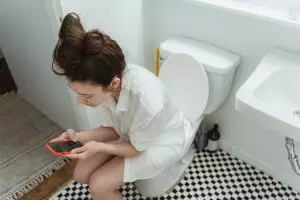By Xiaomei Cai, L.Ac. Ph.D. & Qineng Tan, L.Ac., Ph.D.

Bladder pain and pressure? Urinary urgency? Pelvic pain that feels like a UTI or bladder infection? Interstitial cystitis is a painful bladder syndrome caused by bladder inflammation. Acupuncture and TCM offer an alternative interstitial cystitis treatment that can help relieve interstitial cystitis symptoms.
Interstitial cystitis is a chronic pain condition that is difficult to diagnose and treat with conventional medicine. It is generally considered a urological or gynecological condition, but actually, men and women can both experience what is sometimes referred to as painful bladder syndrome (IC/PBS) or “frequency-urgency-dysuria syndrome.” Dysuria means “painful urination.”
While interstitial cystitis can be different from person to person, the best way to describe it is feeling like you have the urinary frequency that is characteristic of a UTI or symptoms bladder infection all the time—except that there is no bacterial infection present, so the condition does not get better with antibiotics.
Interstitial cystitis and overactive bladder (OAB) share many of the same signs and symptoms and can sometimes overlap. The primary difference between these two conditions is that interstitial cystitis usually involves pelvic pain in addition to urinary urgency, while overactive bladder involves urinary incontinence, but usually not significant bladder pain.
That feeling of bladder pressure and urinary urgency can really get in the way of your daily activities. People who suffer from interstitial cystitis may feel like they’re going to the bathroom every few minutes all day long. Even though they’re peeing a lot, though, the painful urgency to urinate again returns quickly.
Interstitial cystitis involves irritation and inflammation of the bladder that can ultimately cause a buildup of scar tissue in the bladder and may decrease its capacity to hold urine. There may also be small amounts of blood in the urine (hematuria) due to pinpoint bleeding on the bladder walls.
What Causes Interstitial Cystitis?
Medical science has not yet discovered why some people experience interstitial cystitis (IC). It has been suggested that it may be related to an autoimmune disease attacking the bladder or causing inflammatory cells to develop in the bladder, nerve signals that are causing painful sensations even though nothing is wrong, some type of allergic reaction to chemicals in the urine, or sores developing in the bladder lining.
Some people who suffer from interstitial cystitis may also have IBS, fibromyalgia, migraines, or other chronic pain conditions. There is some evidence that IC is associated with also having an autoimmune condition, such as lupus, rheumatoid arthritis, or a thyroid disorder.
Interstitial cystitis bladder pain is a complex problem with both physical and emotional components. The urgency to pee can become so persistent and painful that it gets in the way of normal life, and even relationships. Fortunately, TCM and acupuncture offer holistic treatment for interstitial cystitis that can help relieve pain and anxiety.
Top 5 Interstitial Cystitis Symptoms

Each person’s experience of interstitial cystitis is unique. For some, the uncomfortable sensations of urinary frequency and bladder pressure may come and go. For others, bladder pain may be constant.
The common symptoms of interstitial cystitis include:
- Urinary frequency, peeing a lot
- Urinary urgency, feeling like you have to pee even when you just went
- Only peeing a small amount when you go
- Bladder pain, bladder pressure, pelvic pain, pain in the perineum
- Pain during sex
Menstruation can cause interstitial cystitis pain to worsen, as can certain foods or drinks, having sex, or sitting for long stretches of time.
Top 10 Triggers of Interstitial Cystitis Pain
People with interstitial cystitis are often advised to keep a record of their eating habits and pay attention to what foods or beverages seem to make their symptoms worse.
Things that may trigger bladder pain include:
- Tomatoes
- Citrus fruits
- Alcohol
- Caffeine – coffee, tea
- Carbonated beverages, soda, pop
- Fruit juice
- Chocolate
- Artificial sweeteners
- Milk and other dairy foods
- Spicy foods
Going on an elimination diet, in which you avoid certain foods for a period of time and see if your symptoms abate, may help.
Interstitial Cystitis Treatment
Medical treatment for interstitial cystitis is focused mainly on mitigating symptoms. Painkillers, antihistamines, and antidepressants are most commonly prescribed to help relieve painful bladder syndrome.
Amitriptyline is approved to treat depression, but is sometimes used to help treat autoimmune-related chronic pain due to fibromyalgia and MS, as well as interstitial cystitis.
Elmiron is a drug specifically approved to help protect the lining of the bladder from irritation. It can take several months for it to start working. It has some serious side effects, including potentially permanent damage to the retinas of the eyes.
Bladder instillations for interstitial cystitis are “cocktails” of medicines that are injected into the bladder with a catheter and held for 15-30 minutes. Treatments may be given weekly or a few times per week over the course of several weeks. Some people get relief from their symptoms with this method. Others may find the catheterization process uncomfortable or painful.
None of these treatments are a cure for interstitial cystitis. TCM and acupuncture offer an alternative treatment for painful bladder syndrome that can relieve pain and address the root cause of the problem.
Can Acupuncture Help Interstitial Cystitis?
According to TCM, the healthy function of the bladder relies heavily on the kidney and spleen, which provide yang energy to warm the bladder. When the Kidney Qi is deficient, the bladder may be too weak to hold urine.
Kidney Qi can be weakened by a long illness, or by repeated UTIs that have not been adequately addressed. It has been noted through medical imaging that prolonged illnesses can cause the bladder to contract in size. It can also become much more sensitive.

Painful urination can begin after someone has a difficult childbirth or other trauma to the pelvic organs. This can have consequences that affect someone both physically and emotionally.
Stagnation of Liver Qi can occur due to a strong emotional upset or depression. The Liver channel moves around and through the pelvis and external genital organs, so when Liver Qi is not moving freely, it can lead to pain or dysfunction in this area. Particularly if Liver Qi has too much heat, it can negatively impact the function of the bladder and pelvic floor area.
To determine what is causing interstitial cystitis pain, an acupuncturist will look carefully at other, seemingly unrelated symptoms that person is experiencing.
For example, if bladder pain is accompanied by fatigue, ear ringing (tinnitus), and cold hands and feet, those are all indicators that Kidney Yang is deficient and cold. Ears are considered to be the opening of the Kidney meridian.
If they are thirsty all the time, have a lot of allergies, warm hands, and tend to feel anxious, these are signs that Kidney Yang is too hot.
An acupuncture treatment protocol will then be developed accordingly to address both the pain and pressure on the bladder, as well as the underlying conditions that are causing imbalances in the organ systems.
Moxibustion treatment and electro-acupuncture may also be used to help relieve bladder pain symptoms.
One study in which patients diagnosed with interstitial cystitis were given one acupuncture treatment per week for four consecutive weeks found that urinary frequency was significantly decreased.
Another study showed that a majority of patients who received weekly acupuncture for three months showed significant improvement or complete relief from urinary symptoms.
Another study suggested that acupuncture treatment may help to relieve bladder irritation and urgency by helping to block nerve impulses around the urethra, the neck of the bladder, and the pelvic floor area.
Acupuncture Near Me for Interstitial Cystitis
Acupuncture is a particularly good modality for helping to treat complicated issues when conventional medicine is not working. Interstitial cystitis is still not well understood by modern science, but TCM methods work well to relieve both physical and emotional pain associated with painful bladder syndrome. If you are experiencing urinary frequency and bladder pressure, but know that you don’t have an infection, please consider giving acupuncture a try.
*This article is for education from the perspective of Traditional Chinese Medicine only. The education provided by this article is not approved by FDA to diagnose, prevent, treat and cure human diseases. It should not stop you from consulting with your physician for your medical conditions. Traditional Chinese Medicine is based on Qi, which is an invisible force that usually cannot be observed by modern science. Because science focuses on testing ideas about the natural world with evidence obtained through observation, these aspects of acupuncture can’t be studied by science. Therefore acupuncture and Chinese herbs are often not supported by double-blind, randomized trials, and they are considered alternative medicine therapies in the United States.
